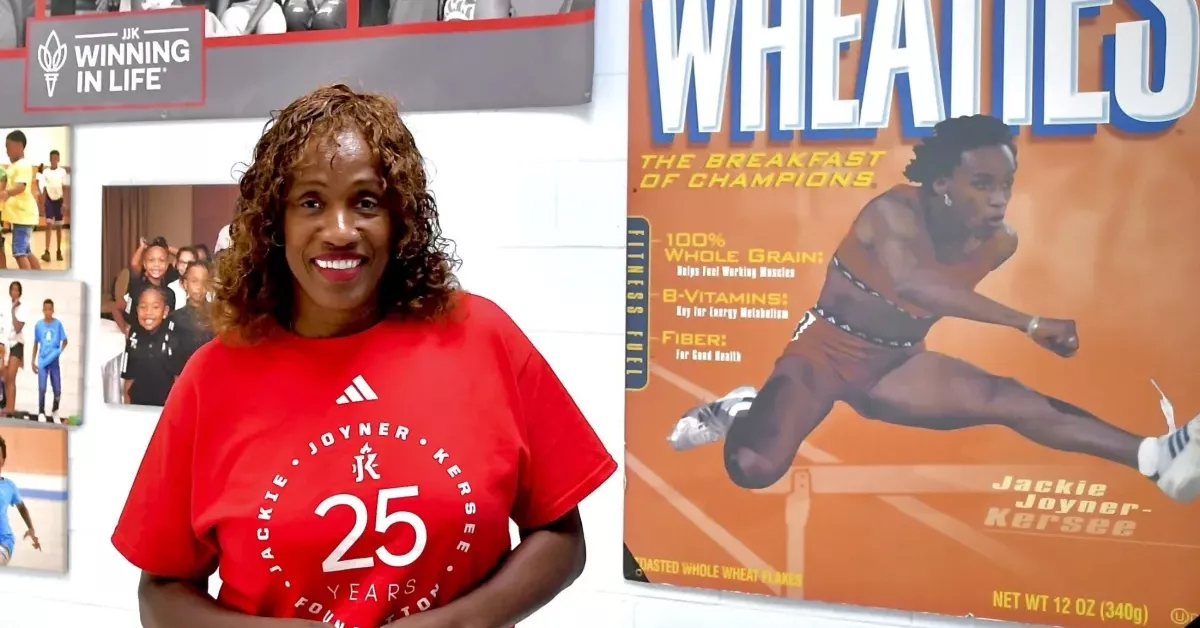The Jackie Joyner-Kersee Community Center turns 25
As you drive into the circle of the Jackie Joyner-Kersee Center — 25 years after its inception and 30 years after its conception as an institution in the economically challenged community of East St. Louis, Illinois — an Adidas-commissioned mural offers a quintessential portrait of the icon known as JJK.
Next to the portrait of the four-time Olympian is the caption, “Black excellence is you,” a mantra and an affirmation that every child entering these doors ingests.
If community adulation were music, those within Joyner-Kersee’s sphere of influence would form a symphony of praise for the humble native daughter who has given so much to her hometown.
“People don’t know my heart and soul and what drives me to be in this community. They sometimes cannot believe it when they see me here. Yes, I could be in LA or in other places, but there is a lot of good here, and I want to counteract the negative stigma about East St. Louis.” – Jackie Joyner-Kersee
Former East St. Louis Mayor Carl E. Officer called Joyner-Kersee “one of the most pre-eminent athletes and human beings in the world.” Her lifelong friend and high school teammate, Dr. Debra Powell — the first female mayor of East St. Louis — said JJK had “the mindset to take what you give her and make it the best.” And her former track coach, Nino Fennoy, reflected that he “learned how to coach with Jackie Joyner-Kersee, and she pushed me to be a better coach.”
Then there’s former Jackie Joyner-Kersee Boys & Girls Club alumna Aja Junior Williams, now a vice president with the local PBS station who affirms that through the JJK Center, “I learned about the importance of community for youth, which has driven me in my life and career today.”
Sitting at her eponymous facility after a quarter of a century, Joyner-Kersee continues to model the athleticism and fitness that define her brand, looking competition-ready in a red polo and black warm-up pants.
She said it was important for children entering the building to know that “Black excellence is in all of us, and I want them to be motivated and inspired and to see the JJK Center as a destination, just as the Mary Brown Center was for me growing up.”
It also was important to improve her service model over the years, adding transportation to maximize access beyond the Jackie Joyner-Kersee Metrolink stop, which adjoins the property, as well as add hot meals for participants as a part of her commitment to the nutrition and health of those who are a part of the JJK ecosystem.
Joyner-Kersee proudly beamed as she noted that her center annually services 10,000 families and serves about 50,000 meals, stressing that “it’s difficult for children to learn if they are hungry.”
The center also hosts a summer program, which had an enrollment of 500 youth this summer.
In addition, the 41,000-square-foot facility has grown into a state-of-the-art campus, replete with on-going construction.
The grounds that surround the center are beyond impressive: a school-based JJK Academy (K-5), football fields with artificial turf, a City SC soccer area, St. Louis Cardinals-sponsored youth baseball diamonds, a new JJK Foundation building, a new JJK Food, Agriculture & Nutrition Innovation Center and, under construction, a new technology facility. Fennoy described it as “the most active physical facility that continues to grow, … and she’s not standing still.”
That was evident when Joyner-Kersee was asked to expound on her legacy and where she sees the JJK Center and Foundation 25 years from now.
Without pausing or taking a breath, she waxed eloquently about her long-term vision: building a $25 million to $50 million endowment for sustainability, constructing an indoor track and field facility, and attracting more corporate and philanthropic support, with the JJK Center as the glue.
“I don’t ever want to become complacent,” she said.
Among the valuable lessons she has learned over the years are, “You have to be a great listener” and that “not everybody is your friend.”
Asked what advice she had for young Black women, she ticked off a thoughtful list:
“Stay connected to people who know you.”
“Don’t let anyone tell you what you can’t do.”
“Be the best version of yourself.”
“Success is an ever-evolving door.”
“Be motivated by the low moments.”
Her pride was clearest when she was asked what she wanted the world to know about her that had never been asked.
After a thoughtful pause, she smiled and said, “People don’t know my heart and soul and what drives me to be in this community. They sometimes cannot believe it when they see me here. Yes, I could be in LA or in other places, but there is a lot of good here, and I want to counteract the negative stigma about East St. Louis.”
It was a sentiment that echoed her mantra of “Black excellence” and, as her friend Dr. Debra Powell put it, “We don’t allow the world to dictate how we feel about East St. Louis. We know who we are. Give us your lemons and we’ll give you some sweet lemonade.”




